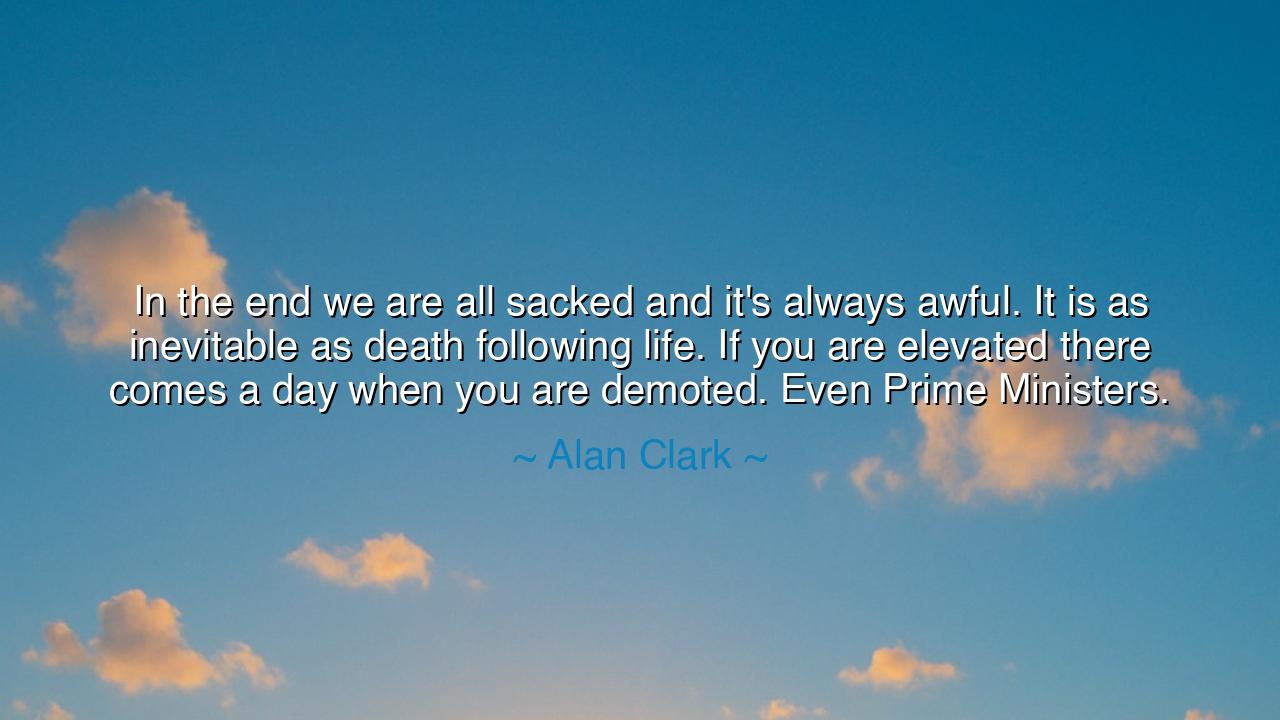
In the end we are all sacked and it's always awful. It is as
In the end we are all sacked and it's always awful. It is as inevitable as death following life. If you are elevated there comes a day when you are demoted. Even Prime Ministers.






“In the end we are all sacked and it’s always awful. It is as inevitable as death following life. If you are elevated there comes a day when you are demoted. Even Prime Ministers.” Thus spoke Alan Clark, the British diarist and politician, a man who gazed without illusion upon the vanity of worldly power. His words, though clothed in the tone of bitter humor, conceal a profound and ancient truth—the truth that all rise and fall are bound together in the great law of impermanence. Every throne is temporary, every crown borrowed. Whether one is a clerk or a king, the hour will come when the world moves on without them. And when it does, as Clark admits, it is always awful, for it strips from us the comfort of our own importance and lays bare the humility of our humanity.
The ancients, wiser in the ways of the heart, understood this cycle well. They taught that fate is a wheel that turns for all: at its height, a man basks in glory; at its base, he lies forgotten in dust. The Romans called it Fortuna, the capricious goddess who lifts men to greatness only to cast them down when they grow proud. The philosophers warned: “Rejoice not too loudly in your success, for it will not stay; despair not too deeply in your failure, for it too shall pass.” Alan Clark, who saw the corridors of politics with their glitter and deceit, merely rephrased in his own age-old tongue what every empire, every court, every soul has eventually learned—that power is fleeting, and the loss of it humbles even the mighty.
Consider the fall of Napoleon Bonaparte, the man who once commanded the destiny of nations. Crowned by ambition, adored by armies, he strode across Europe like a colossus. Yet in the end, he found himself exiled to a barren rock in the Atlantic, stripped of title, authority, and followers. His sacking, though far greater than any office dismissal, was the same in spirit as the one Clark described—a moment when the illusion of permanence is shattered, and a man must face the naked truth of his own mortality. “Even Prime Ministers,” Clark said; even emperors, we might add. For all who rise must one day fall, not by malice alone, but by the natural order of things.
There is a hidden mercy in this inevitability. Though it wounds our pride, it also purifies the soul. For as long as a person clings to the illusion of power, they remain enslaved to it. When that power is taken away—when they are sacked, demoted, forgotten—they are given the rare gift of seeing what endures beyond title and applause. The applause fades, the name is erased from the halls of power, but the deeds of integrity, the friendships of truth, the courage to face loss—these remain. The fall, then, though awful, is not meaningless. It is the furnace in which humility is forged, and wisdom is born.
Alan Clark himself, though a man of vanity and sharp wit, understood this human tragedy. In his diaries, he spoke of envy, of ambition, of the ache of being left behind. Yet beneath his cynicism lay a recognition that such endings are the final price of participation in life’s grand drama. To live fully is to court both triumph and downfall, to taste both victory and humiliation. The one who seeks to rise without accepting the fall seeks to deny the nature of existence itself. For as he wrote, death follows life, and demotion follows elevation—not as punishment, but as the rhythm of being.
The wise, therefore, prepare their hearts for both fortune and its loss. They wear power lightly, like a cloak that may be taken away at any hour. They greet promotion with gratitude, but not pride; they accept dismissal with grace, but not despair. In doing so, they transcend the cycle that ensnares the proud. History’s noblest souls—Marcus Aurelius, Abraham Lincoln, Nelson Mandela—each tasted the sweetness of authority and the bitterness of rejection. Yet their greatness endured not in their rise, but in the dignity with which they met their fall.
So, my friends, remember this: you too shall one day be sacked—if not from your labors, then from your youth, your fame, your strength, or your life itself. Do not let this truth bring you fear, but let it make you wise. Serve with honor while you can, lead with humility, love without condition. And when your hour of departure comes, go with serenity, knowing that no man is greater for holding power, but for how he lets it go. For in the end, all Prime Ministers fall, all empires fade, and all crowns return to dust—but the soul that meets its ending with courage and grace, that soul never truly dies.






AAdministratorAdministrator
Welcome, honored guests. Please leave a comment, we will respond soon